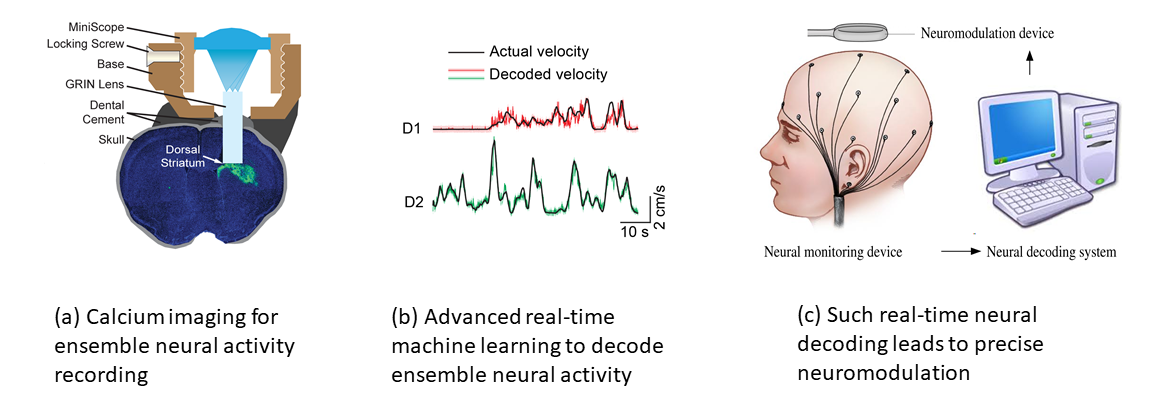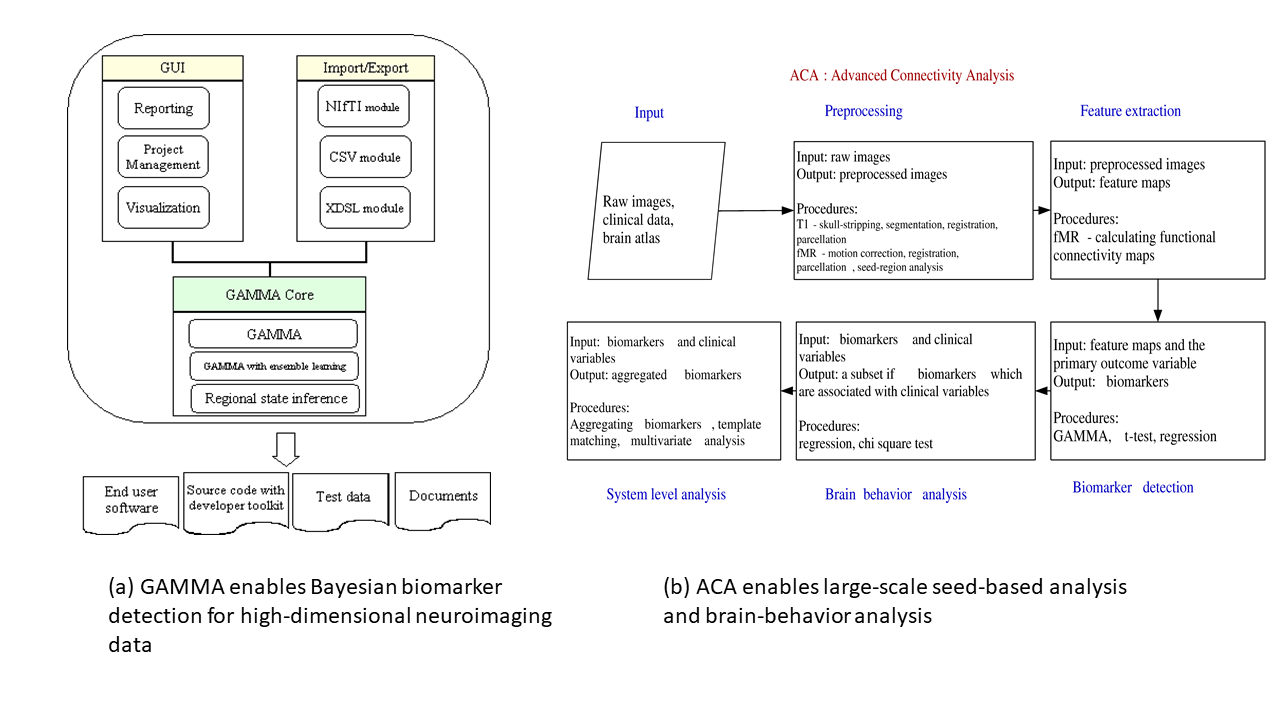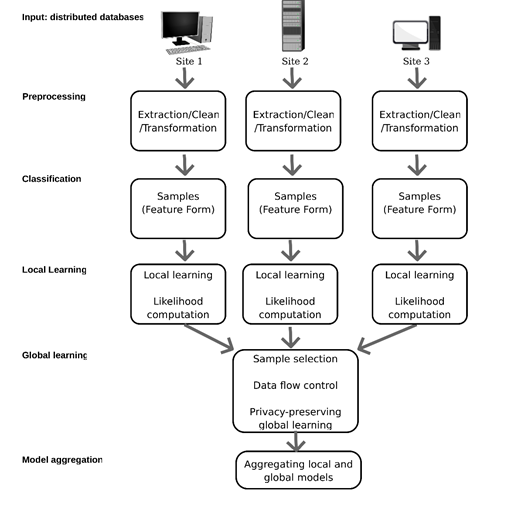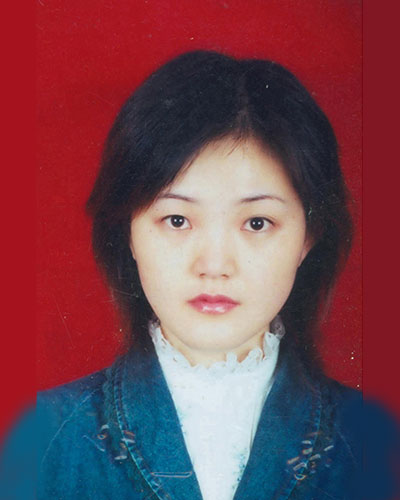Associate Professor, Diagnostic Radiology and Nuclear Medicine
Phone: 410-706-3284
Email: rchen@som.umaryland.edu
Biosketch
Dr. Chen has a strong background in computational neuroscience, machine learning, neuroimaging, clinical and translational research. Dr. Chen runs the Biomedical Data Mining Laboratory in the Department of Diagnostic Radiology and Nuclear Medicine.
Research Projects
As a computer scientist, my current research focuses on advancing the state of the art in specific areas of quantitative science, primarily machine learning and image processing. I have long been intrigued by the incredible effectiveness of deductive reasoning and mathematical modeling in explaining our Universe. Following the same philosophical and mathematical thinking, I have been conducting computational modeling research in neuroscience and medicine. My research focuses on leveraging machine learning, deep learning, and computational modeling to understand the relationship between brain and behavior, leading to novel therapeutic concepts for brain disorders and brain-inspired AI.
I have 20 years of experience in advanced modeling, algorithm, and software development. I have released two open-source biomedical data mining software packages on NITRC: the GAMMA suite and Advanced Connectivity Analysis. I am Associate Vice Chair of AI, Department of Radiology, University of Maryland School of Medicine. I am a senior member of IEEE. I am an editorial member of Journal of Signal Processing Systems, Frontier of Computational Neuroscience, Frontiers of Neurorobotics, the Open Neuroimaging Journal, and the Neuroradiology Journal. My research is funded by NIH and the BRAIN initiative.
Brain Behavior Analysis
A central question in brain science is to understand the linkages between neural activity and cognition and behavior. We proposed a machine learning based computational framework to predict behavior variables based on neural activity features at microscopic and macroscopic scales. At microscopic level, features are ensemble neural activities observed by miniature cellular imaging. At macroscopic level, features are MR imaging based. Our model can accurately predict behavior variables based on imaging features.

- Barbera G, Liang B, Zhang LF, Gerfen CR, Culurciello E, Chen R#, Li Y#, Lin DT#. Spatially Compact Neural Clusters in The Dorsal Striatum Encode Locomotion Relevant Information. Neuron. 92(1):202-213; 2016. # co-corresponding authors. (Role: co-corresponding author)
- Liang B., Zhang LF., Barbera G., Fang WT., Zhang J., Chen XC, Chen R., Li Y., LinDT., Distinct and Dynamic ON and OFF Neural Ensembles in the Prefrontal Cortex Code Social Exploration, Neuron, 100(3):700-714, 2018
- Chen HJ, Shi HB, Jiang LF, Chen L, Chen R. Disrupted topological organization of brain structural network associated with prior overt hepatic encephalopathy in cirrhotic patients, European Radiology, 2017. (Role: corresponding author)
- Wang Z, Wu W, Liu Y, Wang T, Chen X, Zhang J, Zhou G, Chen R. Altered cerebellar white matter integrity in patients with mild traumatic brain injury in the acute stage. PLoS One, 11(3), 2016. (Role: corresponding author)
- Liu, Y., Wang, T., Chen, X., Zhang, J., Zhou, G., Wang, Z., Chen, R., Tract-based Bayesian multivariate analysis of mild traumatic brain injury. Computational and Mathematical Methods in Medicine. 2014. (Role: corresponding author)
- Lee Y., Xie J., Lee EJ, Sudarsanan S., Lin DT, Chen R.*, Bhattacharyya S.S.*, Real-time Neuron Detection and Neural Signal Extraction Platform for Miniature Calcium Imaging, Frontiers in Computational Neuroscience, in press, 2020. (Role: co-corresponding author)
- Chen R., Lin DT., Decoding brain states based on microcircuits, IEEE CBS, 2018.
- Lee Y., Madayambath S., Liu YZ., Lin DT., Chen R., Bhattacharyya SS., Online Learning in Neural Decoding Using Incremental Linear Discriminant Analysis, IEEE International Conference on Cyborg and Bionic Systems, 2017
Data Mining Software for Neuroimaging Data Analysis
Developing software can greatly facilitate the advance of brain science. Scientists who are not heavy-duty informatics types can use these tools to analyze their own data. First, we developed an open-source cross-platform software package called the GAMMA suite for neuroimaging data analysis. It includes algorithms for biomarker detection and Bayesian predictive modeling. Second, we developed a large scale functional connectivity data mining software package called Advanced Connectivity Analysis (ACA). ACA enables large-scale seed-based analysis and brain-behavior analysis. Both the GAMMA suite and ACA are available at NITRC.

- Chen R, Herskovits EH, Graphical Model Based Multivariate Analysis (GAMMA): An Open-source, Cross-platform Neuroimaging Data Analysis Software Package. Neuroinformatics. 12, 119-127, 2012. (Role: lead and corresponding author)
- Software: the GAMMA suite, http://www.nitrc.org/projects/gamma_suite/. (Role: lead developer)
- Chen R, Nixon E, Herskovits EH, Advanced Connectivity Analysis (ACA): A Large Scale Functional Connectivity Data Mining Environment. Neuroinformatics. 14(2): 191-199, 2016. (Role: lead and corresponding author)
- Software: Advanced Connectivity Analysis (ACA), https://www.nitrc.org/projects/aca_rc/. (Role: lead developer)
Distributed Data Mining and Data Fusion
An important problem in big data is to learn models from distributed heterogeneous databases. We developed algorithms to learn probabilistic graphical networks from distributed databases. These algorithms use the collective data mining framework to minimize data transmission, leading to fast modeling and improved data security. These algorithms have been used to analyzing NASA data.

- Chen R, Sivakumar K, Kargupta H, Distributed Web Mining Using Bayesian Networks from Multiple Data Streams. Proceedings of the IEEE Conference on Data Mining. Nov. 2001. (Role: first author)
- Chen R, Sivakumar K, A New Algorithm for Learning Parameters of a Bayesian Network from Distributed Data. Proceedings of the IEEE International Conference on Data Mining. 2002. (Role: first author)
- Chen R, Sivakumar K, Kargupta H, Learning Bayesian Network Structure from Distributed Data, Proceedings of SIAM Data Mining 03. (Role: first author)
- Chen R, Sivakumar K, Kargupta H, Collective Mining of Bayesian Networks from Distributed Heterogeneous Data, Knowledge and Information Systems. 6(2):164-187, 2004. (Role: first author)
Lab Members

Rong Chen, PhD
Assistant Professor
Department of Diagnostic Radiology and Nuclear Medicine
Tel: 410-706-3284
Email: rchen@umm.edu
Former Lab Members
Huajun Chen
Postdoctoral Researcher
Matthew Chen
Summer student

Na Duan, MD
Postdoctoral Researcher
Yun Jiao
Postdoctoral Researcher
Kyunghun Lee
Postdoctoral Researcher

Wenli Qiu, MD, PhD
Postdoctoral Researcher
Shuai Ren
Postdoctoral Researcher
Rodrigo A. Sandon Veliz
Summer student (under UM scholar program)
Michael Shaham
Research Assistant
Xiaomin Wu
Graduate Research Assistant
Ming Yang
Postdoctoral Researcher
Active Grants and Proposals
Dr. Chen's NIH funding profile is available by searching NIH RePORTER using the PI name 'Rong Chen'.
